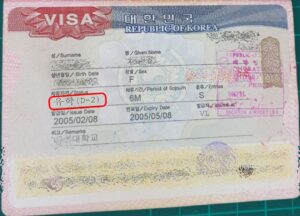The main documentation necessary to prepare to study in South Korea includes:
- university application
- scholarship application (if eligible)
- visa application.
Depending on the program you apply for, the list of documentation and requirements to education background are different (e.g., for undergraduate studies, minimum education background for a student is to be a high school graduate).
All application forms and translations of the original documentations are usually expected to be in English (otherwise, it will be mentioned on a university website if Korean language is preferred).
NOTE:
In order to apply for a university in South Korea as an international student, a student and both his/her parents must hold non-Korean nationality.
University application:
Once a university and the program to join for studies are selected, a student needs to start application process. Every university has the list of the required documents to submit.
The first and the basic document is “Application Form” – every university has its own Application Form which can be downloaded from the university website and must be filled by a prospect student.
Along with the Application Form, other documents in general include the following:
– a copy of original and translated copy of high school graduation certificate (or expected graduation) and transcripts (or a copy of original and translated copy of college diploma and transcripts);
– a copy of study plan (or self-introduction letter with study plan);
– results of the language proficiency test/s (Korean (TOPIK/TOEIC) and/or English (TOEFL/IELTS));
– a copy of financial statement (issued by a bank);
– a copy of the passport (or alien registration card for those living in Korea during application process).
For more detailed information about required documents and minimum scores of the language proficiency tests, a prospect student should better refer to the selected university website since the requirements may slightly differ from university to university and depend on the program/department selected to apply for.
Scholarship application:
International students who wish to study at universities in South Korea can apply for scholarships – either the ones suggested by a university or the scholarships provided by Korean government, or both.
Scholarships can be provided in the form of exemption of the tuition fee (partially or fully) and/or as a monthly financial support transferred to a student’s bank account.
Information about available scholarships provided by a university can be found at a university website where a prospect student wishes to apply for studying.
Detailed information about Korean government scholarships is available at https://www.studyinkorea.go.kr, under the tab “Scholarships”.
When applying for a scholarship, one should carefully read requirements for it and prepare accordingly (including necessary documentation).
Visa application:
Once a university and a program/department is selected and admission confirmation is received, a prospect student should start visa application process.

The first step is to find a website of Embassy of Republic of Korea in the country a student resides. Next, find the information about requirements to apply for Study Visa (D-2). There will be a list of documents necessary to submit, including completed visa application form, certificate of admission (by a university), passport, photo/s, etc. Students can apply for visa personally by themselves or delegate this process to a trusted tourist organization/agency (especially if the embassy is located far from the student’s city/town).
After receiving a study visa, it is better to arrive to Korea at least within 1 week before semester or special studying program starts. It may take a few days to accommodate, to look around the place of living and to meet curators of the program in the university a student arrive to. For long-term staying students, the following necessary steps will be explained at the university (e.g., opening medical insurance, receiving Korean ID foreigner card, opening Korean bank account).
NOTE:
When changing any passport information (e.g., receiving new passport with new serial number) or changing the place of living, a foreign resident must acknowledge Korean Immigration Office about it within a certain time (10~14 days, otherwise a penalty may be charged). For more information about immigration rules, reserving appointment at an immigration office, etc, refer to: https://www.hikorea.go.kr (select EGNLISH).
